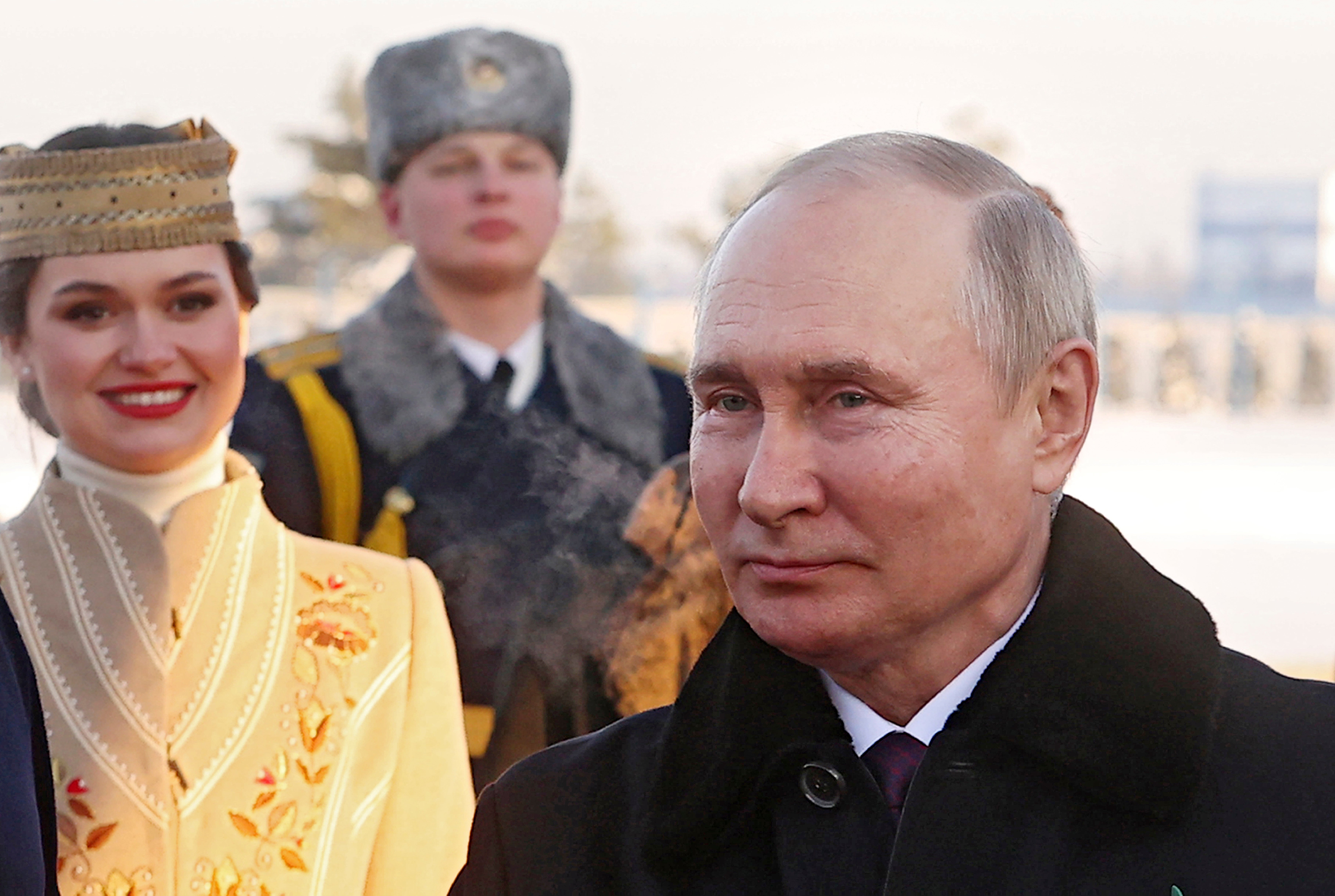
Russia’s president Vladimir Putin is visiting Belarus along with his defence and foreign ministers, as fears grow in Kyiv that Moscow wants to push its closest ally into a new ground offensive in Ukraine.
Sitting alongside Belarus president Alexander Lukashenko before their talks in Minsk, Mr Putin is said to have emphasised the close military-technical ties between the allies.
Mr Putin was allowed to use Belarus as the launchpad for his offensive against Kyiv when the invasion of Ukraine began in February – although Lukashenko has repeatedly said his nation, which relies heavily on Moscow for support, will not enter the war given how unpopular such a move could prove in his country.
Ukrainian joint forces commander Serhiy Nayev had said he believed the talks would address “further aggression against Ukraine and the broader involvement of the Belarusian armed forces in the operation against Ukraine, in particular, in our opinion, also on the ground”. Mr Putin arrived in Minsk shortly after Russia’s defence ministry announced that its troops stationed in Belarus since October will conduct joint military exercises, while three Russian warplanes and an airborne early warning system and control aircraft were deployed to Belarus last week.
In an interview with the Kyiv Post released on Monday, the exiled Belarus opposition leader, Sviatlana Tsikhanouskaya, warned that the chances of Minsk sending soldiers into Ukraine “may increase in coming weeks”. At the weekend, Ukraine's president Volodymyr Zelensky had warned that Russia could be planning another major ground offensive early next year and he was ready for “all possible defence scenarios” against Moscow and its ally.
Germany also said it had “concerns” about the visit to Minsk, with government spokesperson Steffen Hebestreit said to have told reporters at a briefing on Monday afternoon: “Of course, there are concerns about what this visit might entail: whether the role of Belarus in Russia’s war of aggression against Ukraine will once again change or be modified.”
Kremlin spokesperson Dmitry Peskov said Belarus was Russia’s “number one ally” but added that suggestions Moscow aims to pressure Minsk into joining what it calls its “special military operation” were “stupid and unfounded fabrications”.
Mr Putin has been a more public presence in recent days, having met his military chiefs on Friday at the headquarters coordinating the invasion. The trip to Minsk is his first since 2019.
Later on Monday, Russian news agencies reported that Mr Putin had ordered the strengthening of Russia’s borders and greater vigilance from the Federal Security Bureau against foreign infiltration.
Hours before the meeting between the two presidents, Russia hit key infrastructure in and around Kyiv as part of a “kamikaze” drone attack early on Monday. It marked the third Russian airstrike around the Ukrainian capital in a week, while attacks targeting the country’s energy grid have been happening for weeks as Ukraine faces up to a bitterly cold winter.

The Ukrainian Air Force said its air defences shot down 30 drones, including 18 of 23 around Kyiv. Officials said at least three people were injured and nine buildings damaged in the broader Kyiv region and a barrage caused emergency power outages in 11 central and eastern regions of the country, including Kyiv. “As a result of the attack on the capital, critical infrastructure facilities were damaged,” the mayor of Kyiv, Vitali Klitschko, said on the Telegram messaging app. “Engineers are working to quickly stabilise the situation with energy and heat supply.” Separately, the Ukrainian president’s office said the war killed at least three civilians and wounded 11 elsewhere in the country between Sunday and Monday.
Russia’s defence ministry said its forces had shot down four US-made HARM anti-radiation missiles over the Belgorod region, which borders Ukraine, in the space of 24 hours, the state-run TASS news agency reported.
Mr Zelensky urged Western leaders to supply a wide range of weapons systems, especially modern battle tanks, air defence systems and artillery, during a video address to a meeting in Latvia, with the UK prime minister, Rishi Sunak, urging his fellow leaders to ramp up their efforts.
Mr Zelensky said in his address that the drones used in Monday’s strikes were part of a new batch of around 250 acquired by Russia from Iran. Iran has previously acknowledged supplying Moscow with drones but said this was before the invasion.
Elsewhere, EU ministers have finalised a long-awaited deal to implement a natural gas price cap that they hope will help households and businesses better weather excessive price surges, although the European Commission said that it would be ready to suspend the agreed measure if an analysis by regulators shows the risks of the measure outweigh the benefits.




.png?w=600)


